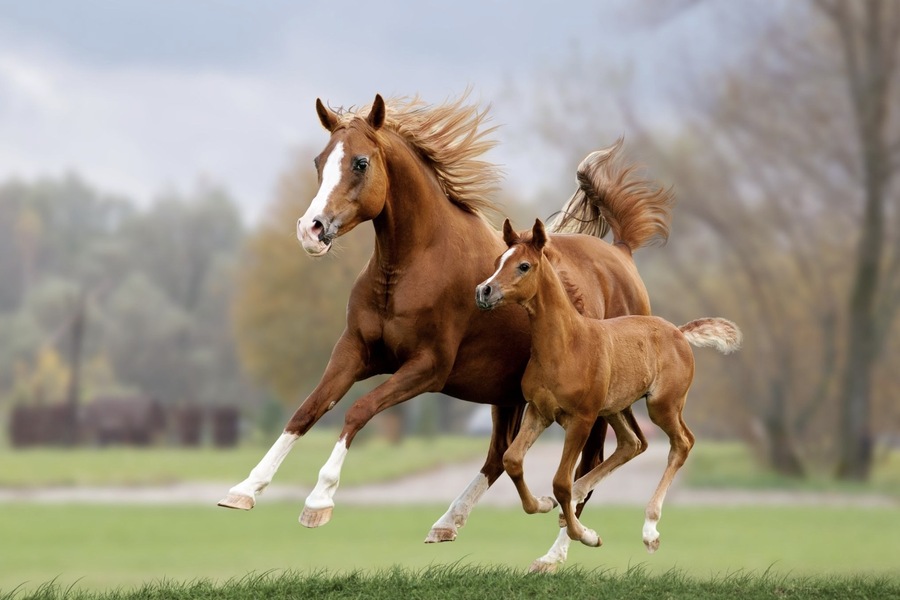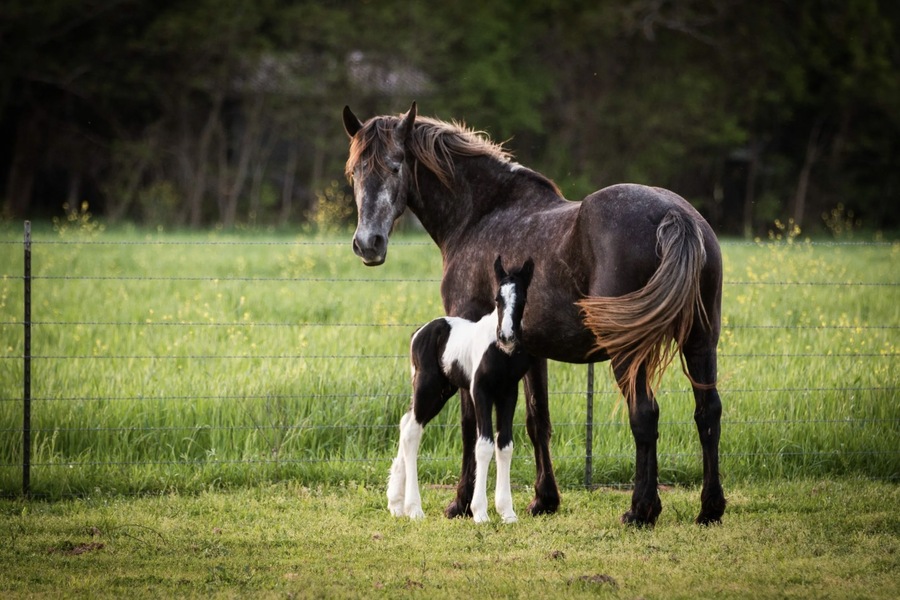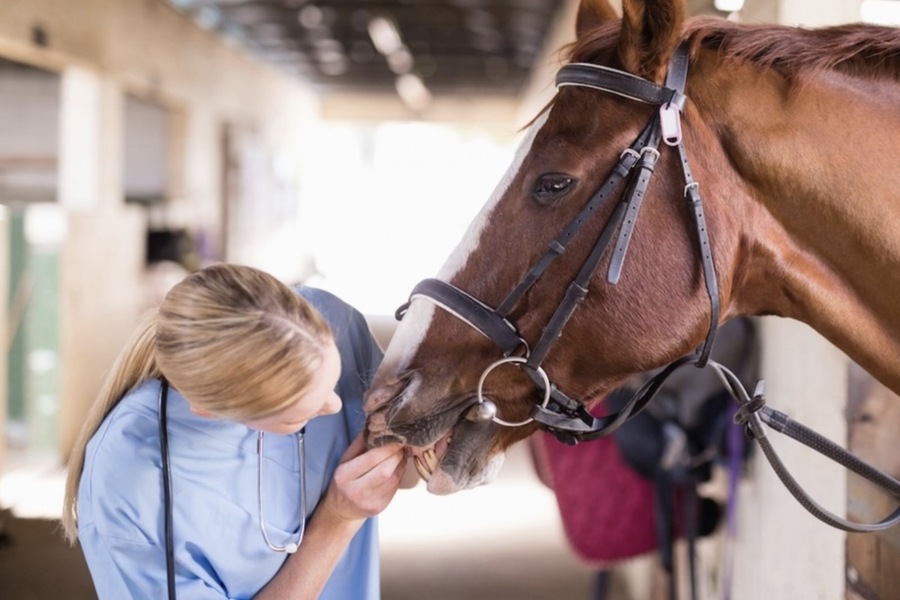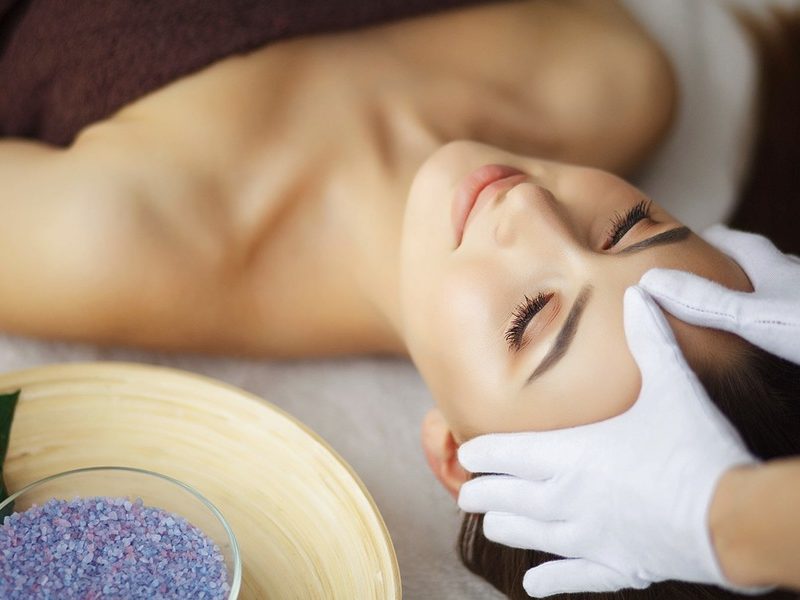Reproductive health is a critical aspect of equine care, particularly for breeders aiming to enhance fertility rates in mares and stallions. The role of nutrition, specifically the impact of essential nutrients like Vitamin E and Selenium, has been increasingly acknowledged in equine reproductive management. These nutrients play a significant role in maintaining hormonal balance, supporting sperm health, and ensuring optimal conditions for conception and fetal development. This article explores how Vitamin E and Selenium can enhance fertility and reproductive health in horses, with a focus on the unique demands faced by horses in Dubai and the UAE region.
The Role of Vitamin E in Equine Reproductive Health
Vitamin E is a potent antioxidant that plays a key role in protecting cells from oxidative damage. This function is especially important in reproductive tissues, where oxidative stress can impact fertility. In mares, Vitamin E supports the health of the ovaries and uterus, helping to maintain an environment conducive to conception and pregnancy. It also aids in ensuring proper immune function, which is critical during pregnancy to protect both the mare and the developing fetus.
For stallions, Vitamin E contributes to sperm quality by reducing oxidative damage, which can impair sperm motility and viability. By ensuring adequate levels of Vitamin E, breeders can help improve overall reproductive outcomes in their horses.
Selenium’s Impact on Fertility in Horses
Selenium is another essential nutrient for reproductive health in horses, particularly because of its role in maintaining thyroid function and protecting cells from oxidative stress. Adequate thyroid function is crucial for reproductive hormone regulation, making Selenium a key element in promoting fertility. For mares, Selenium is necessary to maintain a healthy pregnancy, particularly in ensuring proper development of the placenta.
In stallions, Selenium contributes to sperm production and motility, which directly impacts fertility. Selenium deficiency can lead to reproductive disorders such as low sperm count, poor sperm quality, and impaired reproductive performance. The combination of Vitamin E and Selenium works synergistically to enhance overall reproductive health in horses.

Vitamin E and Selenium Deficiency in Horses: Risks and Consequences
Horses in regions like Dubai and the UAE, where the climate is dry and the quality of natural forage may be limited, are at risk of Vitamin E and Selenium deficiencies. This is because these nutrients are often obtained from fresh pasture, which may not be readily available in such arid conditions. A deficiency in Vitamin E and Selenium can lead to reproductive challenges, including reduced fertility in mares, poor sperm quality in stallions, and increased risk of miscarriage or stillbirths.
For horses, ensuring an adequate supply of these nutrients is essential to maintaining reproductive health, particularly in challenging climates. Supplementation is often necessary to meet these needs, especially for performance or breeding horses that have increased nutrient demands.
Enhancing Mares’ Fertility with Vitamin E and Selenium
Mares require a balanced intake of essential nutrients to support their reproductive system. Vitamin E helps maintain healthy ovarian function and supports the immune system during pregnancy. In addition, it helps reduce the risk of early embryonic loss by protecting the developing fetus from oxidative stress.
Selenium, on the other hand, plays a role in regulating hormonal levels, particularly those involved in pregnancy maintenance. Adequate Selenium levels can improve the development of the corpus luteum, which is responsible for producing progesterone, the hormone that sustains pregnancy. Supplementing mares with Vitamin E and Selenium can lead to improved fertility rates and healthier pregnancies.
The Importance of Vitamin E and Selenium for Stallions
For stallions, reproductive success depends largely on the quality and quantity of sperm produced. Vitamin E’s role as an antioxidant is crucial in protecting sperm from oxidative damage, which can result in decreased sperm motility and overall fertility. Stallions with low levels of Vitamin E may experience reduced semen quality, which directly impacts their reproductive performance.
Selenium works in tandem with Vitamin E to support sperm health by reducing oxidative stress in the testes and improving sperm motility. Stallions that are deficient in Selenium may have lower sperm counts and reduced fertility. Ensuring adequate levels of both Vitamin E and Selenium in stallions can significantly enhance their reproductive potential.
Supplementation: Meeting Nutrient Requirements in Dubai’s Climate
Horses in Dubai and the UAE region often require supplementation to meet their nutritional needs, particularly when it comes to essential nutrients like Vitamin E and Selenium. The arid climate and limited availability of fresh pasture make it difficult for horses to obtain these nutrients naturally. Breeders and horse owners must therefore rely on high-quality supplements to ensure their horses receive adequate levels of Vitamin E and Selenium.
In Dubai’s climate, horses are at risk of oxidative stress due to the heat, which can further impact reproductive health. Supplementation can help mitigate this risk, ensuring that both mares and stallions maintain optimal reproductive function. Reputable brands, such as Eurovets, offer a range of supplements specifically designed to meet the unique needs of horses in this region.
Dosage and Safety Considerations for Supplementing Vitamin E and Selenium
Although Vitamin E and Selenium are indispensable for reproductive health, it is crucial to administer them in the appropriate quantities. Toxicity may result from the oversupplementation of Selenium, which can cause a variety of health issues, such as impaired fertility and other systemic issues. The utmost daily intake of Selenium for horses is 3 mg, while the amount of Vitamin E supplementation required depends on the horse’s size and reproductive status.
It is imperative for horse proprietors and breeders in Dubai to consult with a veterinarian in order to ascertain the appropriate dosage for each horse. A supplementation plan that is customized to the specific needs of horses will guarantee that they receive an appropriate balance of nutrients without the risk of deficiency or toxicity.

Improving Reproductive Outcomes: A Holistic Approach
Enhancing fertility and reproductive health in horses requires more than just supplementation with Vitamin E and Selenium. A holistic approach, including proper diet, regular veterinary care, and environmental management, is essential for achieving optimal reproductive outcomes. Horses should have access to a balanced diet that includes other essential nutrients like omega-3 fatty acids, zinc, and copper, which also play roles in reproductive health.
Additionally, ensuring that horses have appropriate exercise and stress management can further improve fertility rates. Stress can have a significant impact on hormonal balance, so minimizing stressors in the horse’s environment is key to maintaining reproductive health.
Supporting Pregnancy and Fetal Development
Vitamin E and Selenium are not only important for conception but also play a crucial role in supporting pregnancy and fetal development. Mares with adequate levels of these nutrients are less likely to experience pregnancy complications and are more likely to give birth to healthy foals. Vitamin E supports the development of the foal’s immune system, while Selenium is involved in the formation of the placenta and fetal growth.
Supplementing mares throughout pregnancy ensures that both the mare and the foal remain healthy, reducing the risk of miscarriage and improving the chances of a successful birth.
Conclusion
The combined advantages of Selenium and Vitamin E for the reproductive health and fecundity of horses are undeniable. These nutrients are crucial for the proper development of the fetus during pregnancy, the maintenance of hormonal homeostasis, and the support of sperm health. Supplementation is frequently required to satisfy the reproductive requirements of horses in Dubai and the UAE, where natural forage may not provide adequate levels of these nutrients. Breeders can enhance reproductive outcomes and promote the general health of their horses by incorporating Selenium and Vitamin E supplements into the diets of both mares and stallions. To ensure that supplementation programs are customized to the unique requirements of each horse, it is essential to consult with veterinary experts and administer the appropriate dosage.

I am an award-winning freelance writer specializing in financial topics. I have more than a decade of experience, she has been published in The Wall Street Journal, the New York Times and numerous industry magazines, including Harvard Business Review.


